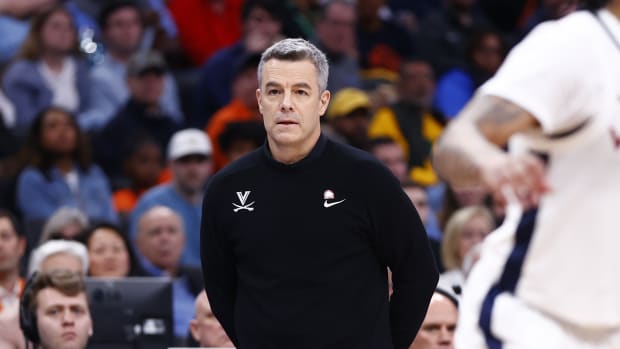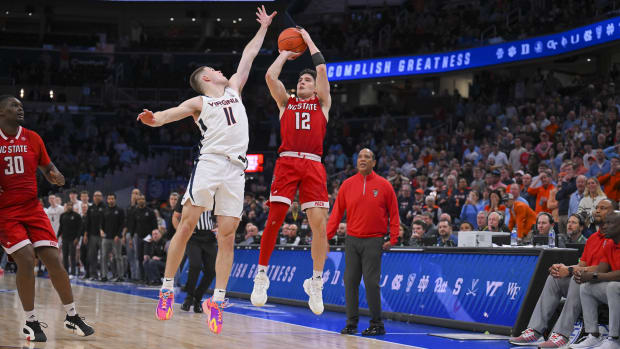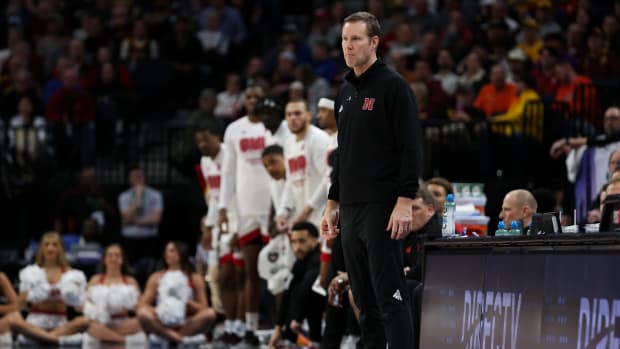Team of Destiny? Virginia's Final Four Win Brings an Elusive Championship Closer Than Ever
MINNEAPOLIS — The boos kept coming, raining down and reverberating around this Nordic-inspired glass behemoth of a football stadium even as teams jogged off the court and into the tunnel, the game’s finality that much more entrenched. They had been overtaken for some brief spans by sounds just as full-throated, expressing emotions just as fully felt: the elation of Virginia fans at their team having reached the program’s first-ever national championship game. But when that jubilation died down, those who had been rooting for Auburn filled U.S. Bank Stadium again with a roaring dismay, refusing to let go of a moment that will be debated, rehashed, and at any rate remembered for a long, long time.
The basics: Virginia trailed Auburn by two points, 62–60, with 1.5 seconds remaining in the game, inbounding the ball after the Tigers had fouled to disrupt the Cavaliers’ last attempt at offense. Ty Jerome inbounded the ball to Kyle Guy in the near corner and Guy immediately leaped to launch a three, which missed as the buzzer sounded, seemingly marking the end of an Auburn victory. But Guy had been contacted by Auburn defender Samir Doughty while coming down from his shot, and as the p.a. announcer began his post-game spiel by dictating the seemingly final score, one of the game’s officials signaled a foul. After momentary confusion, Guy was awarded three foul shots, with 0.6 seconds on the clock. He made all three, and the Tigers’ Bryce Brown could not connect on a desperate attempt to respond.
With that, a Virginia postseason that began as an attempt to exorcise demons was extended once more into thrilling, chaotic fashion with a 63–62 win over Auburn. It was a finish so stunning it left even the winning locker room largely muted, as if trying to process its own survival.
“I still can’t believe it,” said Virginia sophomore De’Andre Hunter, sounding dazed.
“Surreal,” said senior center Jack Salt.
“I can’t even fathom this moment right now,” Guy said. “Coach [Tony Bennett] came in here—he doesn’t get hype too often, but this tournament he’s been getting hype. He didn’t get hype this time because I don’t think he knows what happened.”
He was not alone. The foul call was instantly and obviously a point of contentious debate, the sort of letter-of-the-law infraction that so often divides onlookers into arguments about not only whether it was a foul but also, if it was, whether it should have been called. The NCAA itself felt compelled to email a statement on the call to reporters, quoting the rule that Doughty’s defense violated, which was Rule 4, Section 39.i. “Verticality applies to a legal position and also to both the offensive and defensive players,” reads the rule, as quoted by the NCAA’s statement. “The basic components of the principle of verticality are: The defender may not ‘belly up’ or use the lower part of the body or arms to cause contact outside his vertical plane or inside the opponent's vertical plane.”
Such explanation was surely cold comfort to the fans who had already begun joyously rolling Toomer’s Corner and to all those who were otherwise on or aligned with the game’s losing end. “NCAA needs to get some new refs,” Brown said aloud as the Tigers filtered toward the locker room. Doughty placed a hand on one of Brown’s shoulders and repeated, “Come on, bro,” in an apparent attempt to calm his teammate.
Minutes later, Doughty sat shirtless in front of his locker, eyes red. “Whether it’s right or wrong, they ref in the Final Four because they do a great job at reffing,” said Doughty, a junior. “They’re gonna try their best to make the right call.” He explained that based on film study he had been wary of Guy kicking his feet out on three-point attempts, though Guy did not appear to do so on his last shot.
“They hadn’t been calling them fouls all game,” Doughty added a few moments later (and, it should be noted, there were only 24 fouls called all game). “There were actually plays where there were fouls on three-point shots and it wasn’t getting called at all. So for them to call that play, call that foul that last play was kind of surprising.”
Doughty’s coach, Bruce Pearl, seemed to share a similar sentiment in his postgame press conference. “My advice, as an administrator of the game, is if that’s a foul, call it,” Pearl said. “Call it at the beginning of the game, call it in the middle of the game, call it at the end of the game. Don't call it any more or less at any other time during the game. That was the call.”
“This will be a memorable game,” Pearl also said. “And I’d like it to be remembered for a great game. Let’s not remember this game because of just how it ended. Let’s remember two teams that played really hard. ... It was a great college basketball game.”
It was. To Pearl’s point, what the game had largely lacked in sharpshooting—the two teams, two of the country’s best from beyond the arc, combined to make just 32.0% of their three-pointers—it had made up for with the elements of a captivating, high-stakes grind. There were Jerome’s 13 first-half points (out of his team’s 28), and Auburn’s Anfernee McLemore’s 12 rebounds. There was the Tigers’ normally breakneck backcourt of Brown and Jared Harper both fighting through illness and shooting funks to hit timely, pivotal threes to help their team erase a 10-point deficit in the final five minutes in order to hold that late, fleeting lead. There was Brown’s own go-ahead corner trey, seemingly enshrining him as the game’s closing hero.
Then, first, there was a non-call that many are sure to remember as well. Bringing the ball up the floor before Guy’s final shot, Jerome tried to dribble behind his back, only for the ball to strike his foot and bounce briefly out of his control. He re-secured the ball and resumed dribbling, which would normally result in a double dribble, but none was called—a miss that was lost on many watching live and understood even by those involved. “That’s such a bang-bang play,” said Auburn assistant coach Steven Pearl. “How’s the ref supposed to see that he kicked the ball as opposed to our guy touching it? That’s a tough one... It’s one of those things you’ve gotta deal with.”
Before that, with seven seconds remaining, Guy had nailed another three from the opposite corner, shrinking Auburn’s lead from four to one. Virginia intentionally fouled Harper on the ensuing possession, and the point guard made his first free throw before missing his second. Shortly thereafter came Jerome’s inbound to Guy and the call that dominated the postgame discussion. The play was designed to include options for a lob to Mamadi Diakite as well as for Hunter to break himself free in the middle. Instead Jerome found Guy in the corner, who shot and drew the fateful foul. Asked what he felt on the play, Guy at first demurred. “There’s gonna be controversy no matter what I felt,” he said. “I felt like there was no way I was gonna land. He was in my space. I think the ref obviously made the right call, in my opinion. Auburn’s gonna think otherwise.”
Many of its players did. “It definitely wasn’t a foul in my opinion, from my view,” Brown said. “We played well enough to win, but down the stretch it wasn’t in our control. I feel like you gotta let the players decide the game.”
Ultimately it was Guy who held the game in his hands. Officials restored six-tenths of a second to the game clock as Guy went to the line, a monotone of boos soundtracking the moment. Guy, an 82.5% free-throw shooter who had not attempted any in the game to that point, needed to make three to win the game and two to send it to overtime. Anything less and the Cavaliers’ season was over. “I wasn’t settling for two,” Guy said later. “I was either gonna make one or I was gonna make three.”
In many ways it was fitting that Guy would be the center of such a moment. He had been the Virginia player who most publicly wrestled with the team’s historic loss to 16th-seeded UMBC last March, going so far as to use images of himself from the defeat as his Twitter avatar and phone screensaver. After Saturday’s game he referred to that upset as the third-best moment of his life for the way that it helped him grow as a person. Until beating Auburn it trailed only his engagement to his fiancee, Alexa Jenkins, whom he looked for in the stands in Minneapolis before taking Saturday’s decisive free throws.
“I couldn’t see her because she’s too short,” Guy said. “So I saw my dad. We made eye contact and he said, ‘You got this.’ I said, ‘Yeah, I know I do.’”
After making the first two, tying the game, Auburn called timeout, perhaps attempting to mess with Guy’s psyche. As Virginia huddled, Guy drifted from the group, who purposely ignored him in kind. “It’s like the guy that’s got to make the five-foot putt to win the tournament,” assistant coach Brad Soderberg said. “You just leave him alone.”
“I didn’t hear one word anyone said,” Guy said. “I didn’t want any part of what they were talking about. I just wanted to focus on me.”
Guy, of course, made the third, triggering an outburst of excitement that not only drowned out Auburn fans’ protest but may have also been audible in Charlottesville. “He was cold-blooded for that,” Diakite said. “I would have lost my mind.”
“We all practiced those [game-winning] shots as a kid,” Guy said. “They were probably a little bit more spectacular than free throws, but whatever it takes to win.”
Where that win takes them now is the national title game and the verge of completing a remarkable one-year journey from this event’s greatest flop to one of its most memorable and redemptive champions. Virginia had gotten to Saturday by way of one of this season’s most dramatic games, beating Purdue in overtime after tying the game on a Diakite buzzer beater (and Kihei Clark pass) that Hoos fans will be reliving and recreating for decades. In the glow of this exhilarating finish, as Auburn tried to digest its fate’s cruelty a few locker rooms away, a number of reporters could not help asking the Cavaliers if theirs was a team of destiny.
“That’s what it feels like right now,” Hunter said. At least there, at least then.




